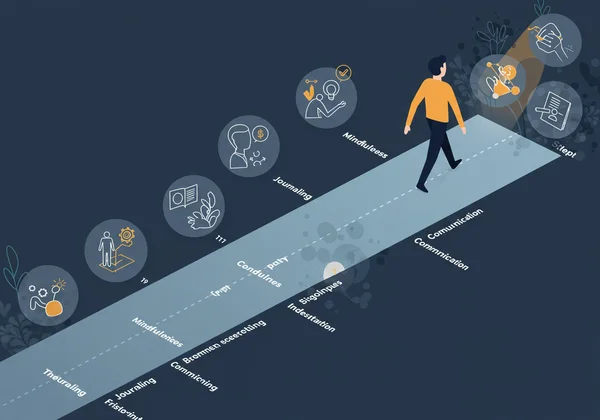ผลการทดสอบอเล็กซิทิเมีย: คะแนนและข้อมูลเชิงลึกจากรายงาน AI
August 10, 2025 | By Caleb Sterling
คุณเพิ่งทำ แบบทดสอบอเล็กซิทิเมีย เสร็จสิ้น และตอนนี้กำลังมองดูตัวเลขอยู่ใช่ไหม สงสัยไหมว่ามันมีความหมายกับคุณจริง ๆ อย่างไร? บางทีคุณอาจกำลังถามตัวเองว่า คะแนนของคุณมีความหมายอย่างไรต่อชีวิตประจำวันและความสัมพันธ์ของคุณจริงๆ? คุณไม่ได้อยู่คนเดียว คะแนนเป็นเพียงจุดเริ่มต้น คู่มือนี้จะช่วยอธิบายผลลัพธ์ของคุณ เปลี่ยนคะแนนเริ่มต้นนั้นให้เป็นข้อมูลเชิงลึกที่มีความหมายเกี่ยวกับโลกแห่งอารมณ์ของคุณ เราจะสำรวจว่าคะแนนของคุณบ่งชี้ถึงอะไร และรายงานส่วนบุคคลโดย AI ที่เป็นเอกลักษณ์ของเราสามารถมอบความเข้าใจที่ลึกซึ้งยิ่งขึ้นได้อย่างไร นำทางคุณไปสู่ขั้นตอนที่นำไปปฏิบัติได้จริงเพื่อการเติบโต พร้อมที่จะ ทำความเข้าใจโลกภายในทางอารมณ์ของคุณ แล้วหรือยัง?
การทำความเข้าใจคะแนนการทดสอบอเล็กซิทิเมียของคุณ
ผลการทดสอบอเล็กซิทิเมียของคุณคือจุดเริ่มต้นของการเดินทางสำรวจตนเอง เป็นภาพรวม ข้อมูลชิ้นหนึ่งที่สามารถส่องสว่างให้เห็นรูปแบบที่คุณอาจเคยรู้สึกแต่ไม่สามารถระบุชื่อได้ มาทำความเข้าใจว่าข้อมูลนั้นมีความหมายอย่างไร

ความหมายของ "คะแนนสูง" ในการทดสอบอเล็กซิทิเมีย
ประการแรก เป็นสิ่งสำคัญอย่างยิ่งที่จะต้องเข้าใจว่าคะแนนสูงไม่ใช่การตัดสินหรือการวินิจฉัย เพียงแต่บ่งชี้ว่าคุณอาจมีลักษณะสำคัญของอเล็กซิทิเมีย ลักษณะเหล่านี้มักรวมถึงความยากลำบากในการระบุความรู้สึกของตนเอง ปัญหาในการแยกแยะระหว่างอารมณ์และความรู้สึกทางร่างกาย และความสามารถที่จำกัดในการถ่ายทอดความรู้สึกของคุณให้ผู้อื่นฟัง สำหรับหลายๆ คน เช่น Jordan ผู้ใช้งานของเราที่มักรู้สึก "งุ่มง่ามทางอารมณ์" คะแนนสูงอาจเป็นช่วงเวลาแห่งการยืนยัน เป็นการตั้งชื่อให้กับประสบการณ์ตลอดชีวิตของการรู้สึกไม่สอดคล้องกับโลกภายในของตนเองและกับผู้อื่น คะแนนสูงไม่ใช่ป้ายที่บ่งบอกว่าคุณ "มีปัญหา" แต่เป็นเครื่องชี้ทางที่ชี้ไปยังวิธีการประมวลผลอารมณ์ที่แตกต่างออกไป

การตีความช่วงคะแนนอเล็กซิทิเมียที่แตกต่างกัน
การทดสอบของเราให้ผลลัพธ์ที่เป็นสเปกตรัม เนื่องจากอเล็กซิทิเมียเองเป็นลักษณะที่เป็นมิติ—ทุกคนอยู่ในระดับใดระดับหนึ่งบนมาตรวัด
- คะแนนต่ำ: บุคคลในช่วงนี้โดยทั่วไปจะมีความยากลำบากน้อยมากหรือไม่เลยในการระบุ ทำความเข้าใจ หรือสื่อสารสภาวะทางอารมณ์ของตนเอง พวกเขามักจะรับรู้ความรู้สึกของตนเอง
- คะแนนปานกลาง: คุณอาจรับรู้ลักษณะบางอย่างของอเล็กซิทิเมียในตัวเองได้ บางทีคุณอาจระบุอารมณ์ที่รุนแรง เช่น ความโกรธหรือความสุขได้ แต่ก็ประสบปัญหาเกี่ยวกับความรู้สึกที่ละเอียดอ่อนกว่า หรือบางทีคุณอาจพบว่าเป็นการยากที่จะแสดงอารมณ์ของคุณ แม้ว่าคุณจะรู้ว่ามันคืออะไรก็ตาม ช่วงคะแนนนี้บ่งชี้ถึงพื้นที่สำหรับการเติบโตที่อาจเกิดขึ้นในด้านการตระหนักรู้อารมณ์
- คะแนนสูง: ดังที่ได้กล่าวไปแล้ว สิ่งนี้บ่งชี้ถึงลักษณะอเล็กซิทิเมียที่สำคัญ แสดงให้เห็นว่าความท้าทายในการระบุและอธิบายความรู้สึกน่าจะเป็นส่วนหนึ่งของประสบการณ์ของคุณอย่างสม่ำเสมอ ซึ่งอาจส่งผลกระทบต่อความสัมพันธ์และความเป็นอยู่ที่ดีของคุณ นี่คือจุดที่เครื่องมือสำหรับการพัฒนามีประโยชน์อย่างยิ่ง
กรอบการทำงาน OAQG2: การทดสอบของเราวัดลักษณะของอเล็กซิทิเมียอย่างไร
เพื่อให้แน่ใจว่าผลลัพธ์ของเราน่าเชื่อถือและมีความหมาย การประเมินของเราอิงตามแนวคิดทางจิตวิทยาที่ได้รับการยอมรับ โดยหลักแล้วมาจากหลักการของแบบวัดต่างๆ เช่น แบบสอบถามอเล็กซิทิเมียออนไลน์ (OAQ-G2) กรอบการทำงานที่ทันสมัยนี้ประเมินคุณลักษณะสำคัญหลายประการของอเล็กซิทิเมีย เช่น ความยากลำบากในการระบุความรู้สึก ความยากลำบากในการอธิบายความรู้สึก และการคิดที่มุ่งเน้นภายนอก (แนวโน้มที่จะมุ่งเน้นเหตุการณ์ภายนอกมากกว่าประสบการณ์ภายใน) ด้วยการใช้แนวทางที่เป็นระบบและมีข้อมูลทางวิทยาศาสตร์ เราสามารถให้การประเมินเบื้องต้นที่น่าเชื่อถือแก่คุณได้ ความมุ่งมั่นต่อกรอบการทำงานที่น่าเชื่อถือนี้ทำให้เครื่องมือของเรามีประโยชน์ไม่เพียงแต่สำหรับผู้ที่สำรวจตนเองเท่านั้น แต่ยังรวมถึงนักเรียนและผู้เชี่ยวชาญที่กำลังมองหาเครื่องมือคัดกรองที่เชื่อถือได้
เจาะลึกกับรายงานส่วนบุคคลโดย AI ของคุณ
คะแนนให้บทสรุปที่มีคุณค่า แต่การค้นพบตนเองที่แท้จริงนั้นเผยออกมาในรายละเอียด นี่คือข้อได้เปรียบหลักของเรา: รายงานส่วนบุคคลโดย AI เป็นฟีเจอร์เสริมที่ออกแบบมาสำหรับผู้ที่ต้องการก้าวข้าม "อะไร" ไปสู่ "ทำไม" และ "อย่างไร" หากต้องการรับ ข้อมูลเชิงลึกที่ลึกซึ้งยิ่งขึ้นที่นี่ เพียงแค่ให้บริบทสถานการณ์ที่ไม่ระบุชื่อบางส่วน แล้ว AI ของเราจะสร้างรายงานที่เป็นของคุณโดยเฉพาะ
มากกว่าแค่คะแนน: ข้อมูลเชิงลึก AI ที่เป็นเอกลักษณ์เกี่ยวกับรูปแบบทางอารมณ์ของคุณ
รายงาน AI นั้นเหนือกว่าแค่ตัวเลข มันวิเคราะห์การตอบสนองเฉพาะของคุณเพื่อระบุจุดแข็งและความท้าทายส่วนบุคคลของคุณที่เกี่ยวข้องกับการประมวลผลอารมณ์ ตัวอย่างเช่น รายงานอาจเน้นว่าคุณเก่งในการรับรู้ความรู้สึกทางร่างกาย แต่ก็ประสบปัญหาในการเชื่อมโยงความรู้สึกเหล่านั้นกับอารมณ์ หรืออาจชี้ให้เห็นถึงรูปแบบการจัดการความขัดแย้งระหว่างบุคคลของคุณ นี่คือ รูปแบบทางอารมณ์ ที่ละเอียดอ่อนซึ่งคะแนนเดียวไม่สามารถจับต้องได้ ทำให้เห็นภาพโลกภายในอารมณ์ของคุณได้อย่างสมบูรณ์ยิ่งขึ้น

ขั้นตอนที่นำไปปฏิบัติได้จริงจากรายงาน AI อเล็กซิทิเมียของคุณ
ความรู้ทรงพลัง แต่ความรู้ที่มีแผนการนั้นเปลี่ยนแปลงชีวิต คำมั่นสัญญาของแบรนด์ของเราคือ "ทำให้การสำรวจง่ายขึ้น ทำให้ชีวิตมั่งคั่งขึ้น" และ ขั้นตอนที่นำไปปฏิบัติได้จริง ในรายงาน AI ของคุณเป็นหัวใจสำคัญของภารกิจนั้น รายงานจะสร้างคำแนะนำที่เฉพาะเจาะจงและเป็นส่วนตัวตามโปรไฟล์ของคุณ สิ่งเหล่านี้ไม่ใช่เคล็ดลับทั่วไป แต่เป็นกลยุทธ์ที่ปรับให้เหมาะกับคุณ ซึ่งอาจรวมถึงการเขียนบันทึกประจำวันเพื่อเสริมสร้างคำศัพท์ทางอารมณ์ การฝึกสติเพื่อเชื่อมโยงกับความรู้สึกทางร่างกาย หรือกรอบการสื่อสารเพื่อใช้กับคู่ครอง สำหรับคนอย่าง Chris ที่ประสบปัญหาในการบำบัด ขั้นตอนเหล่านี้สามารถกลายเป็นชุดเครื่องมือเชิงปฏิบัติเพื่อความก้าวหน้า

การวิเคราะห์ AI ช่วยเพิ่มความเข้าใจตนเองและการเติบโตได้อย่างไร
ท้ายที่สุด เป้าหมายของรายงาน AI คือการส่งเสริม ความเข้าใจส่วนบุคคล ที่ลึกซึ้งและเสริมพลังให้คุณเติบโต มันช่วยให้คุณเชื่อมโยงจุดต่างๆ ระหว่างลักษณะอเล็กซิทิเมียของคุณกับสถานการณ์จริงในชีวิต—ความสัมพันธ์ของคุณ การตอบสนองต่อความเครียด และการตัดสินใจของคุณ การมองเห็นความเชื่อมโยงเหล่านี้อย่างชัดเจน คุณจะมีความพร้อมมากขึ้นในการตัดสินใจอย่างมีสติซึ่งนำไปสู่ชีวิตที่สมบูรณ์ยิ่งขึ้นและเชื่อมโยงทางอารมณ์มากขึ้น มันเปลี่ยนแนวคิดนามธรรมของอเล็กซิทิเมียให้เป็นแผนที่ส่วนบุคคลสำหรับการพัฒนา
ขั้นตอนต่อไปหลังจากทบทวนผลการทดสอบอเล็กซิทิเมียของคุณ
ผลลัพธ์ของคุณ—ไม่ว่าจะเป็นคะแนนอย่างรวดเร็วหรือรายงาน AI ที่ละเอียด—คือจุดเริ่มต้นใหม่ พวกมันเป็นเครื่องมือเพื่อความเข้าใจ ไม่ใช่ข้อตัดสินสุดท้าย บทต่อไปคือการบูรณาการการรับรู้อันใหม่นี้เข้ากับชีวิตของคุณ
การบูรณาการข้อมูลเชิงลึกเกี่ยวกับอเล็กซิทิเมียเข้ากับชีวิตประจำวันของคุณ
เริ่มต้นจากสิ่งเล็กๆ เริ่มต้นด้วยการฝึกฝนความอยากรู้อยากเห็นเกี่ยวกับโลกภายในของคุณ เมื่อคุณรู้สึกถึงความรู้สึกทางร่างกาย (เช่น ความรู้สึกจุกในท้อง) ให้หยุดและถามว่า "สิ่งนี้อาจบอกอะไรฉัน?" เก็บ "บันทึกอารมณ์" เพื่อฝึกตั้งชื่อความรู้สึกของคุณ แม้ว่าคุณจะไม่แน่ใจในตอนแรกก็ตาม แบ่งปันผลลัพธ์ของคุณกับเพื่อนที่ไว้ใจหรือคู่ครอง ไม่ใช่เพื่อเป็นข้ออ้าง แต่เป็นการอธิบายเพื่อให้พวกเขาเข้าใจประสบการณ์ของคุณ ทุกก้าวเล็กๆ สร้างการตระหนักรู้อารมณ์ที่มากขึ้น
เมื่อใดควรขอคำแนะนำจากผู้เชี่ยวชาญสำหรับลักษณะของอเล็กซิทิเมีย
สิ่งสำคัญคือต้องจำไว้ว่าการประเมินของเราเป็นเครื่องมือคัดกรองเพื่อวัตถุประสงค์ด้านข้อมูลและการสำรวจตนเองเท่านั้น ไม่ใช่สิ่งทดแทนการวินิจฉัยทางการแพทย์หรือจิตวิทยาโดยผู้เชี่ยวชาญ หากผลลัพธ์ของคุณทำให้คุณไม่สบายใจ หรือหากลักษณะของคุณส่งผลกระทบอย่างมีนัยสำคัญต่อชีวิตประจำวัน ความสัมพันธ์ หรือสุขภาพจิตของคุณ เราขอแนะนำอย่างยิ่งให้คุณขอ คำแนะนำจากผู้เชี่ยวชาญ นักบำบัดที่มีคุณสมบัติเหมาะสมสามารถให้การวินิจฉัยอย่างเป็นทางการและนำทางคุณผ่านการบำบัดตามหลักฐาน เช่น CBT หรือกลุ่มฝึกทักษะ คุณสามารถใช้ผลลัพธ์ของคุณเป็นจุดเริ่มต้นสำหรับการสนทนานี้ได้

สำรวจแหล่งข้อมูลเพิ่มเติมบนเว็บไซต์ของเรา
การเดินทางของคุณไม่ได้สิ้นสุดลงที่หน้าผลลัพธ์ เรามุ่งมั่นที่จะเป็นศูนย์รวมทรัพยากรที่ครอบคลุมสำหรับคุณ เราเผยแพร่งานเขียนอย่างต่อเนื่องซึ่งสำรวจหัวข้อต่างๆ เช่น อเล็กซิทิเมียและออทิสติก การจัดการอเล็กซิทิเมียในความสัมพันธ์ และกลยุทธ์การรับมือในทางปฏิบัติ เราขอเชิญคุณเรียกดูบล็อกของเราและทำความเข้าใจให้ลึกซึ้งยิ่งขึ้น สำรวจลักษณะของคุณ และเรียนรู้เพิ่มเติมเกี่ยวกับภาวะที่พบบ่อยแต่ก็มักถูกเข้าใจผิดนี้
เส้นทางข้างหน้าของคุณ: ข้อมูลเชิงลึกที่นำไปปฏิบัติได้จริงจากแบบทดสอบอเล็กซิทิเมียของคุณ
การทำความเข้าใจผลการทดสอบอเล็กซิทิเมียของคุณเป็นการแสดงออกถึงการตระหนักรู้ในตนเองอันทรงพลัง มันสามารถเป็นกุญแจที่ปลดล็อกความเข้าใจใหม่เกี่ยวกับพฤติกรรมในอดีตของคุณ และเปิดประตูสู่อนาคตที่คุณตั้งใจสร้างขึ้น ไม่ว่าคุณจะเริ่มต้นด้วยคะแนนอย่างรวดเร็วตามหลักวิทยาศาสตร์ของเรา หรือเจาะลึกในรายงานส่วนบุคคลโดย AI ที่ไม่มีใครเทียบได้ คุณกำลังก้าวไปอย่างกล้าหาญ คุณกำลังเลือกที่จะสำรวจโลกภายในของคุณ และเราอยู่ที่นี่เพื่อทำให้การสำรวจนั้นง่ายขึ้นและชีวิตของคุณมั่งคั่งยิ่งขึ้น
พร้อมที่จะเริ่มต้นหรือยัง? เริ่มทดสอบฟรีของคุณ วันนี้ และค้นพบข้อมูลเชิงลึกที่รอคุณอยู่
คำถามที่พบบ่อยเกี่ยวกับผลการทดสอบอเล็กซิทิเมีย
คุณสามารถวินิจฉัยอเล็กซิทิเมียด้วยตนเองโดยใช้แบบทดสอบออนไลน์ได้หรือไม่?
ไม่ได้ คุณไม่สามารถทำได้ เครื่องมือของเรา เช่น แบบสอบถามคัดกรองออนไลน์อื่นๆ ถูกออกแบบมาเพื่อการสำรวจตนเองและการระบุลักษณะที่เป็นไปได้ การวินิจฉัยภาวะทางจิตเวชอย่างเป็นทางการต้องกระทำโดยผู้เชี่ยวชาญด้านสุขภาพที่มีคุณสมบัติเหมาะสม เช่น นักจิตวิทยา หรือ จิตแพทย์ หลังจากการประเมินอย่างละเอียดถี่ถ้วน
คุณจะบอกได้อย่างไรว่าคุณมีอเล็กซิทิเมียจากการทดสอบ?
คะแนนสูงในการทดสอบของเราบ่งชี้ว่าคุณมีลักษณะที่เกี่ยวข้องกับอเล็กซิทิเมียอย่างชัดเจน แสดงว่าคุณอาจประสบปัญหาอย่างมากในการระบุและอธิบายอารมณ์ของคุณ คิดว่าแบบทดสอบนี้เป็นกระจกสะท้อนแนวโน้มของคุณ แทนที่จะเป็นป้ายกำกับที่แน่นอน วิธีที่ดีที่สุดที่จะทราบแน่ชัดคือการปรึกษาผลลัพธ์ของ แบบทดสอบอเล็กซิทิเมียออนไลน์ของเรา กับผู้เชี่ยวชาญด้านสุขภาพจิต
การบำบัดใดดีที่สุดสำหรับอเล็กซิทิเมีย หากฉันมีคะแนนสูง?
แม้ว่าจะไม่มี "การรักษา" เพียงวิธีเดียว แต่แนวทางการบำบัดหลายอย่างได้รับการพิสูจน์แล้วว่ามีประสิทธิภาพในการจัดการลักษณะของอเล็กซิทิเมีย การบำบัดที่เน้นทักษะ รวมถึงการบำบัดความคิดและพฤติกรรม (CBT) บางรูปแบบ สามารถช่วยให้บุคคลเรียนรู้ที่จะระบุและตั้งชื่ออารมณ์ได้ การฝึกสติและการบำบัดที่เน้นร่างกายก็เป็นประโยชน์เช่นกันสำหรับการสร้างการเชื่อมโยงระหว่างจิตใจและร่างกายที่แข็งแกร่งขึ้น นักบำบัดสามารถช่วยกำหนดแนวทางที่ดีที่สุดสำหรับคุณได้
ทำไมฉันถึงสื่อสารความรู้สึกได้ไม่ดี แม้จะมีผลการทดสอบแล้ว?
การรู้ว่าคุณมีลักษณะของอเล็กซิทิเมียเป็นก้าวแรก แต่ไม่ได้สร้างทักษะการสื่อสารทางอารมณ์ได้ทันที ทักษะนี้เปรียบเสมือนกล้ามเนื้อ ต้องพัฒนาไปตามกาลเวลาด้วยการฝึกฝน ผลการทดสอบของคุณให้ "อะไร" (ความยากลำบากกับความรู้สึก) และเครื่องมือต่างๆ เช่น รายงาน AI และการบำบัด สามารถให้ "อย่างไร" (กลยุทธ์ในการฝึกฝนและพัฒนา) แก่คุณได้ จงอดทนและเมตตาต่อตนเองในขณะที่คุณเรียนรู้